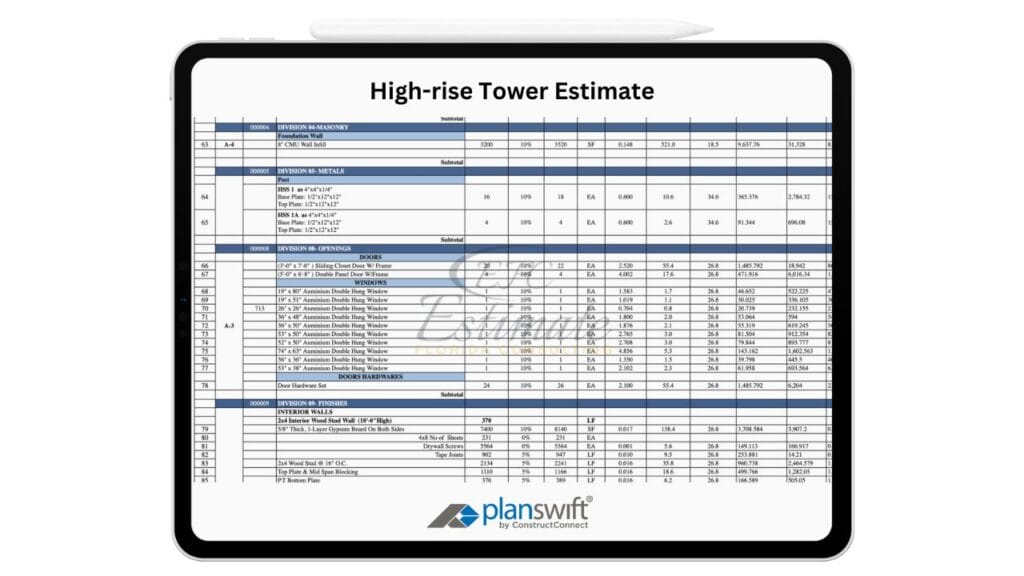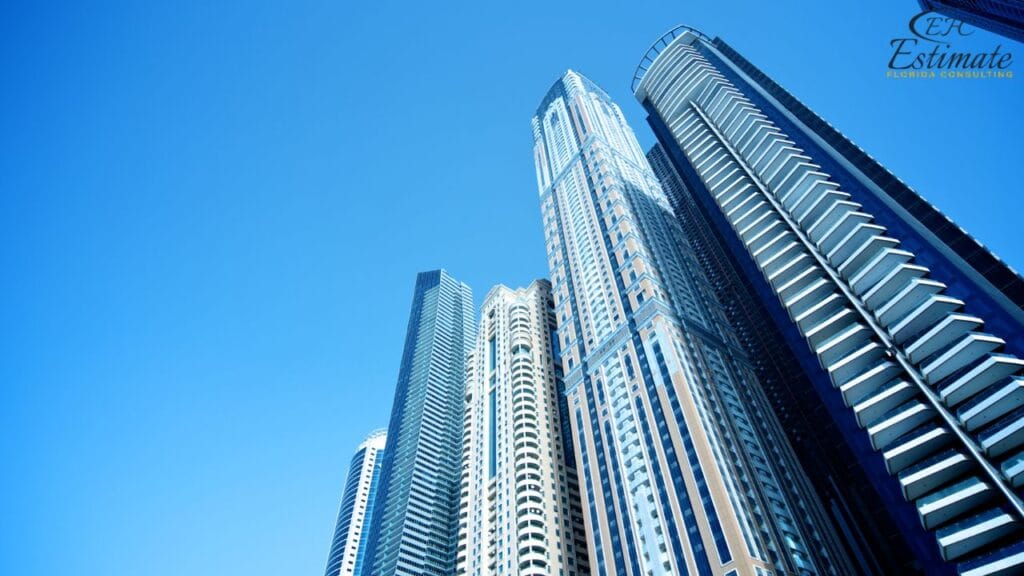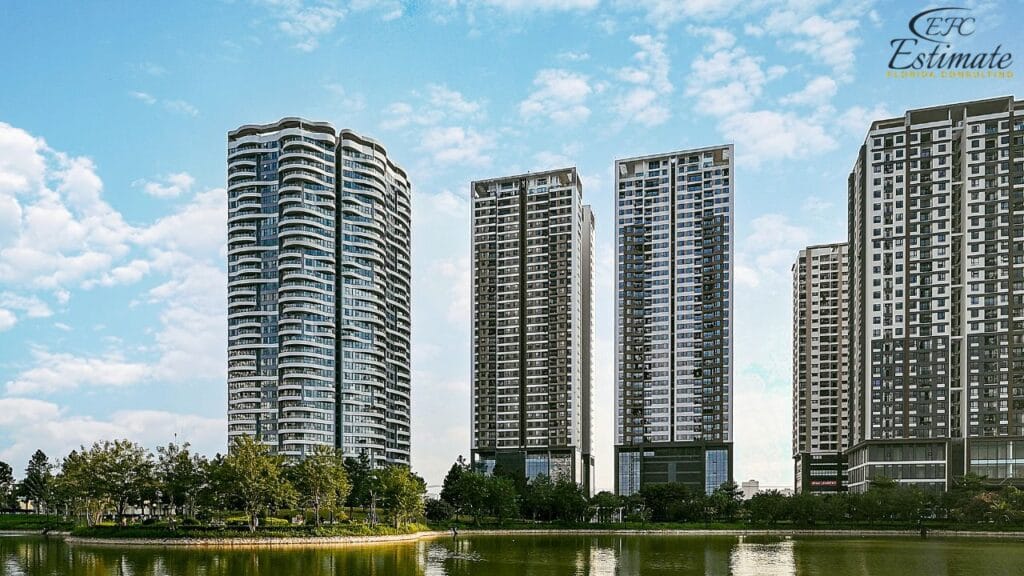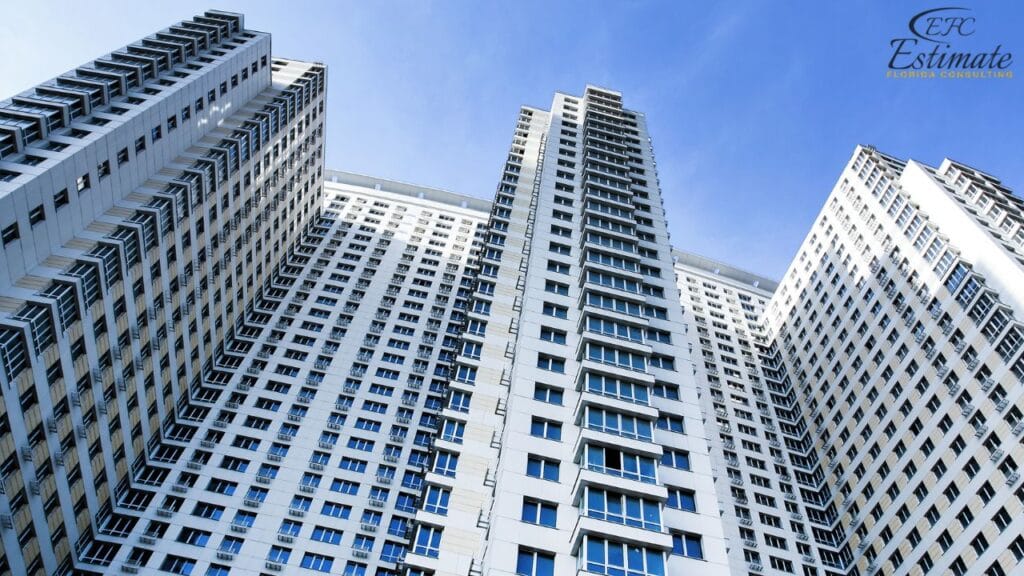90% More Chances to Win Projects With Our Estimate!
- Multi-Family Building
- Hotel Building
- Hospital Building
- Warehouse Building
- School & University Building
- High-Rise Building
- Shopping Complex
- Data Center Building

High-rise towers are an essential part of Florida’s urban landscape, offering both residential and commercial spaces in densely populated areas. Constructing a high-rise tower requires meticulous planning, understanding the costs involved, and an awareness of local regulations. As a professional estimator with experience in Florida construction, this blog aims to provide a detailed cost estimator for high-rise tower construction. Whether you’re a general contractor, subcontractor, developer, or a homeowner, understanding these costs can help streamline your budgeting process.

To provide a clearer understanding of high-rise tower costs, we will break down the primary components involved in the construction process. Each phase of construction comes with its own set of expenses that must be meticulously planned and budgeted. Understanding these costs is essential for developers, investors, and contractors alike.
Before construction begins, the site must be thoroughly prepared to ensure stability and suitability for building. Site preparation includes several crucial activities, such as clearing the land of any vegetation, debris, or old structures, followed by excavation to create a solid foundation. Grading is essential to achieve a level surface, allowing for proper drainage and structural integrity. The costs associated with site preparation can vary significantly based on the existing conditions of the land.
Item | Estimated Cost |
Clearing and Grading | $15,000 – $30,000 |
Excavation | $10,000 – $25,000 |
Site Utilities | $5,000 – $15,000 |
The structural framework forms the backbone of a high-rise tower, comprising the installation of beams, columns, and floors that provide the building’s strength and stability. This phase requires significant labor and material investment, especially as high-rise towers necessitate robust frameworks to withstand wind loads and seismic activity.
Item | Estimated Cost |
Concrete and Steel | $150,000 – $300,000 |
Labor | $100,000 – $200,000 |
High-rise towers require complex MEP systems that are critical for the comfort, safety, and functionality of the building. These systems encompass HVAC (heating, ventilation, and air conditioning), electrical systems, and plumbing installations, all of which must be integrated seamlessly into the structure.
Item | Estimated Cost |
HVAC Systems | $50,000 – $150,000 |
Electrical Systems | $30,000 – $100,000 |
Plumbing | $20,000 – $50,000 |
Interior finishes are vital for creating an appealing and functional environment within high-rise towers. These finishes encompass a range of elements, including flooring, wall finishes, and fixtures, contributing significantly to the overall aesthetics and usability of the space.
Item | Estimated Cost |
Flooring | $30,000 – $80,000 |
Wall Finishes | $20,000 – $50,000 |
Fixtures | $15,000 – $35,000 |
Landscaping and external works enhance the overall appeal of the tower and can add considerable value to the property. Thoughtful landscaping can create inviting outdoor spaces that attract residents and enhance the building’s marketability.
Item | Estimated Cost |
Landscaping Design | $5,000 – $15,000 |
Hardscaping | $10,000 – $30,000 |
Lighting and Irrigation | $5,000 – $15,000 |

Several key factors contribute to the overall costs of high-rise towers. A thorough understanding of these factors is crucial for managing budgets effectively and avoiding unexpected expenses.
Location is one of the most significant determinants of high-rise construction costs. Urban areas with high demand for housing or commercial space often have elevated land prices, directly impacting the project’s budget. Additionally, proximity to essential infrastructure—such as public transportation, utilities, and emergency services—can further influence costs.
Moreover, local economic conditions, zoning laws, and market trends play critical roles in determining the feasibility and financial viability of high-rise projects. Understanding the local real estate market is essential for accurately estimating the costs and potential returns associated with a high-rise development.
The design and architectural style of a high-rise tower significantly influence construction costs. Unique or complex designs often require specialized materials, skilled labor, and advanced construction techniques, all of which can add to the overall budget. Collaborating with experienced architects and engineers early in the process can help optimize designs for both aesthetic appeal and cost efficiency.
Additionally, the choice of design can affect long-term operational costs, including energy efficiency, maintenance, and overall functionality. Investing in innovative design practices can result in better resource management and lower costs in the building’s lifecycle.
The selection of materials and labor availability are critical aspects of high-rise tower construction costs. High-quality materials may have higher upfront costs but can lead to significant savings over time through durability and reduced maintenance needs. Factors such as the sourcing of materials, transportation costs, and availability of local suppliers can all impact the final cost.
Labor costs are another vital consideration. The construction market in Florida can be competitive, and the demand for skilled workers may fluctuate, affecting wage rates. It is essential to budget for potential labor shortages or increases in hourly rates, which can have substantial impacts on overall project costs.
Compliance with local building codes and regulations is crucial for any construction project, particularly for high-rise towers, which must adhere to stringent safety and structural standards. These codes are designed to ensure the safety and welfare of building occupants and the surrounding community but may require additional engineering, design work, and permits, adding to the overall cost.
Understanding and navigating these regulations can be complex and time-consuming. Engaging with experienced professionals who are familiar with local building codes can help streamline the process and minimize potential delays and costs associated with non-compliance.

High-rise towers can be categorized based on their intended use and design, each type having distinct characteristics and cost implications.
These buildings primarily serve as residential units, offering apartments or condominiums with various amenities tailored to residents’ needs. Residential towers often include common areas such as gyms, lounges, and rooftop gardens, which enhance livability but also increase construction costs.
The architectural design of residential towers can significantly influence their market appeal. Factors such as unit layout, window placement, and the integration of sustainable features like energy-efficient appliances and smart home technology play critical roles in attracting potential buyers or tenants.
Commercial towers are designed to accommodate business operations, including offices, retail spaces, and conference facilities. These buildings often require robust infrastructure to support technology, telecommunications, and high-capacity elevators, making them complex projects with specific technical requirements.
The design of commercial towers can vary widely, from sleek modern facades to more traditional aesthetics, depending on the target market. Moreover, commercial buildings need to consider tenant needs, including flexible workspaces and collaborative areas, which can add layers to the design and consequently the cost.
Mixed-use towers combine residential, commercial, and recreational spaces into a single structure. This multifaceted design maximizes land use and caters to the modern urban lifestyle, where residents prefer access to shops, offices, and leisure activities within walking distance.
While mixed-use developments can command premium prices due to their convenience and amenities, they also require careful planning to ensure that the different uses coexist harmoniously. The complexity of integrating various functionalities can lead to increased construction costs but can also yield higher returns on investment through diversified revenue streams.
Florida’s unique real estate landscape and regulatory environment present specific challenges and opportunities for high-rise construction. The demand for high-rise living and working spaces has surged, especially in urban centers like Miami, Orlando, and Tampa. This demand, coupled with Florida’s vibrant tourism industry, necessitates a thorough understanding of local market trends and costs.
Moreover, Florida’s climate impacts construction practices, especially concerning materials and design strategies. For instance, buildings must withstand hurricane conditions, necessitating the use of reinforced materials and adherence to stringent safety codes. Engaging local experts who understand these nuances can significantly enhance project feasibility and cost accuracy.
The integration of technology in high-rise construction is transforming the industry, enabling more efficient processes and innovative solutions. Building Information Modeling (BIM), for instance, allows for precise planning and visualization of projects, reducing the likelihood of costly errors and rework.
Additionally, advancements in prefabrication and modular construction techniques can expedite timelines and lower labor costs. Smart building technologies enhance energy efficiency and operational performance, leading to long-term cost savings. Embracing technology not only improves efficiency but also positions developers favorably in a competitive market.

Sustainability is becoming a critical consideration in high-rise construction. The use of eco-friendly materials, energy-efficient systems, and sustainable design principles can reduce a building’s environmental impact and operational costs.
Implementing green building certifications, such as LEED (Leadership in Energy and Environmental Design), can also enhance the marketability of high-rise towers, attracting environmentally conscious tenants and buyers. Sustainable practices contribute to the long-term viability of projects while also benefiting the community and environment.
High-rise construction is not without its challenges. From managing project timelines to coordinating multiple contractors and subcontractors, the complexities can lead to delays and cost overruns. Weather conditions, particularly in Florida, can also pose significant challenges, impacting construction schedules.
Effective communication and project management are essential for navigating these challenges. Regular progress monitoring and contingency planning can help mitigate risks and ensure that projects remain on track.
Financing a high-rise tower project requires careful consideration of various funding sources. Options include traditional bank loans, private equity investments, and government grants. Understanding the pros and cons of each financing method is crucial for selecting the best fit for the project.
Engaging with financial advisors who specialize in real estate development can help developers navigate the complex landscape of financing options and secure the necessary funds for their high-rise projects.
While high-rise construction can be expensive, several strategies can help reduce overall costs. These include:
By proactively addressing cost factors, developers can enhance the financial viability of their high-rise projects.

The future of high-rise development is likely to be shaped by evolving consumer preferences, technological advancements, and sustainability considerations. Emerging trends include:
Staying ahead of these trends will be essential for developers looking to thrive in the competitive high-rise market.
Estimating the costs of high-rise tower construction involves navigating a complex landscape of factors, materials, and technologies. By understanding these elements and employing strategic planning and budgeting, stakeholders can ensure the successful completion of high-rise projects. At Estimate Florida Consulting, we are committed to providing accurate and reliable cost estimation services tailored to the unique challenges of high-rise construction in Florida. Our expertise empowers clients to make informed decisions and maximize their investments in the ever-evolving world of high-rise development.
The average cost of constructing a high-rise tower in Florida can vary significantly based on various factors, including location, design complexity, and materials used. Generally, the costs can range from $200 to $500 per square foot. For a more precise estimate, it’s essential to consult a local estimator who understands the specific market conditions.
Several factors can influence the construction costs of high-rise towers, including:
Site preparation costs can vary based on the condition of the land but typically range from $30,000 to $70,000. This includes clearing, grading, excavation, and site utilities, which are essential for a stable foundation.
The structural framework, including concrete and steel materials and labor, can range from $250,000 to $500,000, depending on the building's size and complexity. High-quality materials are crucial for ensuring structural integrity.
MEP systems are vital for a building's functionality and comfort. The estimated costs are:
Interior finishes, which enhance the aesthetics and usability of the space, generally cost between $65,000 and $165,000. This estimate includes flooring, wall finishes, and fixtures.
Common challenges include:
Yes, financing options include traditional bank loans, private equity investments, and government grants. Each option has its pros and cons, and working with a financial advisor specializing in real estate can help determine the best fit for your project.
To help reduce costs, consider the following strategies:
Technology plays a crucial role in improving efficiency and reducing costs. Building Information Modeling (BIM) allows for precise project planning and visualization. Additionally, advances in prefabrication can speed up construction timelines and lower labor costs.
At Estimate Florida Consulting, we offer detailed cost estimates across all major trades, ensuring no part of your project is overlooked. From the foundation to the finishing touches, our trade-specific estimates provide you with a complete and accurate breakdown of costs for any type of construction project.

We take pride in delivering accurate, timely, and reliable estimates that help contractors and builders win more projects. Our clients consistently praise our attention to detail, fast turnaround times, and the positive impact our estimates have on their businesses.
Estimate Florida Consulting has helped us win more bids with their fast and accurate estimates. We trust them for every project!

Submit your project plans, blueprints, or relevant documents through our online form or via email.
We’ll review your project details and send you a quote based on your scope and requirements.
Confirm the details and finalize any adjustments to ensure the estimate meets your project needs.
Receive your detailed, trade-specific estimate within 1-2 business days, ready for your project execution.

561-530-2845
info@estimatorflorida.com
Address
5245 Wiles Rd Apt 3-102 St. Pete Beach, FL 33073 United States
561-530-2845
info@estimatorflorida.com
Address
5245 Wiles Rd Apt 3-102 St. Pete Beach, FL 33073 United States
All copyright © Reserved | Designed By V Marketing Media | Disclaimer